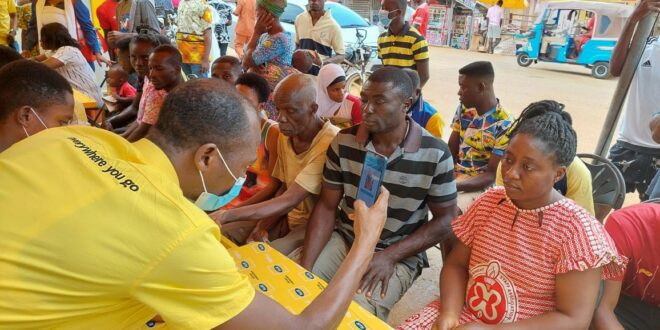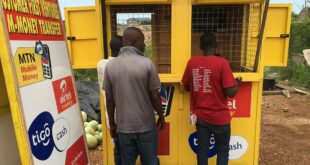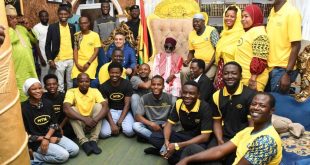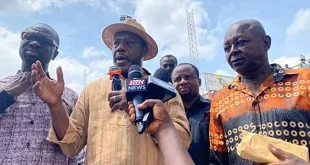The government has extended the SIM card re-registration date to September 30, 2022.
During a press conference held today, Sunday, July 31, 2022, Ursula Owusu-Ekuful, Minister of Communications and Digitalization, revealed this.
“The program will be extended until September 30th in order to mark the anniversary of its beginning and give us a full year.
According to the Minister, voice and internet services will not be available to any sim that has not been registered by the end of August.
The deadline for everyone to reregister their SIM cards with their Ghana Cards was originally July 31.
Nonetheless, the Communications and Digitalization Minister, Ursula Owusu-Ekuful, stated at a press conference on Sunday that the extension came after discussions with industry stakeholders.
“Upon consultation with the industry and in view of the challenges enumerated above, I have very reluctantly decided to grant a conditional extension. The programme will be extended to 30th September to end on the anniversary of its commencement.”
Despite difficulties with the Ghana Card, such as long lines and other issues, the Minister highlighted that many Ghanaians still failed to register their SIMs after the deadline was extended.
So, this deadline extension is the last one.
The numbers show that when the initial deadline was extended on March 21st, there was a 90 percent decrease in SIM reregistration.
Before a week ago, there were no lines; instead, people began going to register as soon as they realized the deadline was approaching after going to bed.
“The mobile network operators, NCA, and the NIA have all employed additional people, obtained the necessary logistics, and are paying significant sums to complete this exercise successfully,” she continued.
Read her statement below:
PRESS BRIEFING BY THE MINISTER FOR COMMUNICATIONS AND DIGITALISATION . MINISTRY OF INFORMATION CONFERENCE ROOM . 31st JULY, 2022
The Hon. Minister for Information
Hon. Deputy Ministers
Heads of Departments and Agencies off the MoCD
Directors, and staff of the MoCD,
Distinguished Ladies and Gentlemen
We are here to brief the public through you, on some activities of the Ministry of Communications and Digitalisation.
Technology has been driving innovation and productivity, giving countries that embrace it a competitive advantage over others. Most developing countries continue to lag behind because of their inability to take advantage of the opportunities technology provides to restructure and grow their economies.
The fourth industrial revolution (4IR), which is the technological revolution driven largely by digital technology, presents us with an opportunity to expedite our economic growth and development through the usage, deployment, and exploitation of ICTs, especially digital technology, to transform our economies and share in the associated productivity and efficiency gains.
At the core of the 4IR is connectivity, access and security. The Government through the Ministry of Communications and Digitalisation has therefore focused on improving connectivity, access and skills development in a secured environment. This is the Digital Ghana we are developing.
My presentation will focus on the Rural Telephony Project, Girl’s-In-ICT, and an update on the SIM Re-registration exercise which ends today.
THE RURAL TELEPHONY PROJECT
Expanding access to broadband, voice and data connectivity, is indispensable to and facilitates economic growth. GSMA, an industry organization representing mobile operators globally, conducted a study for the period from 2000-2017 and the results indicated that a 10% increase in mobile penetration increases GDP growth up to 2%.
“Investing in broad-based digitalization, from a geographic and sectoral point of view, is crucial not only to address socioeconomic problems but also to deal with peace and security challenges. And it boosts economic growth. A study by the International Telecommunication Union found that 10 percent greater mobile broadband penetration would generate a 2.5 percent rise in Africa’s GDP per capital” – CRISTINA DUARTE is special adviser on Africa to United Nations Secretary-General António Guterres (IMF Publication Mar’2021 – Africa Goes Digital after CoVID 19)
Another recent study in 2021 (The Economic Impact of broadband and digitization through the COVID-19 period – Econometric modelling) also estimated that an increase of 1 per cent in mobile broadband penetration yields an increase in 0.16 per cent in GDP.
Over 3,000 communities in Ghana had zero connectivity to mobile voice and data in 2020. This represented approximately 4.5 – 5 million people spread across the nation with a need and desire for voice and high-speed data services who were cut off from the rest of the country.
Mobile Network Operators (MNOs) are reluctant to build ‘Cell Sites’ in these rural communities as the low economic activities and sparse population there makes it economically unviable. Extending connectivity is capital intensive and expensive and without government intervention, these rural communities will remain cut off and unable to participate in the digital revolution which is gradually unfolding in our country. One lesson COVID taught us is the absolute necessity of digital connectivity to facilitate education, access to healthcare, economic activity and commerce, access to and utilisation of public services etc.
The Ghana Rural Telephony and Digital Inclusion Project is constructing 2016 cell sites, half of which are solar powered, in unserved and underserved rural communities across the country, deploying low-cost base stations using the HUAWEI RURAL STAR INNOVATIVE SOLUTION. The project is being implemented in partnership with Huawei and China National Technical Import and Export Corporation (CNTIC) with a €155 million facility secured by the Government in 2020 from the China EXIM Bank.
The Huawei Rural Star Solution, was developed in Ghana and reduces the Total Cost of Ownership (TCO) by 60% compared with traditional connectivity solutions. It will enhance network coverage via a low-cost 2G/3G/ services and will be upgraded to 4G data and voice that can be scaled up on-demand as the communities develop.
The rollout of the Phase 1 is ongoing and is planned to be completed by 2023 with all 2016 sites commissioned and integrated with MNO’s. Overall voice and data traffic reported as at June’2022 had reached 38,629,463 voice minutes and 62,014 GB of data traffic with 507,000 subscribers. With the current deployment plan and integration with MNOs to complete all 2016 sites (active cells) we will achieve significant increase in traffic (voice and data) and meet our goal for universal access and connectivity to rural areas reaching 3.4 Million Subscribers.
This will allow GoG to increase its overall revenue, reduce the digital divide, increase financial inclusion and overall Socio economic improvement creating positive impact on the GDP.
It is a shared infrastructure for all MNOs to provide service on and to improve connectivity and enhance user experience, we have mandated National Roaming. This allows phones to automatically connect to the Mobile Network with the best Quality of Service available in any area, regardless of which Operator one is primarily subscribed to. The GRTDIP network has been dubbed RURALCOM. I urge you to try it out when next you are in the catchment area of any of its sites by activating roaming on your device and send us the requisite feedback.
Since the inception of the Project in November 2020 when H.E the President launched it at Atwereboana in the New Edubiase Constituency, 890 sites have been built with 403 on Air (Active) delivering voice and data services as at July, 2022.
We are currently working on the documentation for phase 2 of the project which will cover 1.1 million subscribers and upgrade the network to 4G for all subscribers.
GIRL’S-IN-ICT
This year marks 10 years since the GIRL’S-IN-ICT Project was launched by the ITU and celebrated annually in Ghana. By the end of 2021, approximately 5,000 girls had been given basic computer literacy and exposed to digital innovations to encourage their interest in ICT education. Government continues to work to bridge the gender digital divide by encouraging and empowering girls and young women to consider studies and careers in the growing field of ICTs, enabling both girls and technology companies to reap the benefits of greater female participation in the ICT sector through the Girl’s -In -ICT (GIICT) programme.
In 2021 2000 girls from the Western North and North East Regions were trained in Basic Computer Skills, Fundamentals of Programming, Scratch and HTML.
In order to continue encouraging girls to pursue careers in the evolving, lucrative ICT industry and in recognition of the many more girls in deprived communities who need to be exposed to the programme, we have scaled up the programme this year and plan to double the number trained in the previous 9 years in one year by training 5,000 girls and 500 teachers from Bono, Bono East, Ahafo, Savannah and the Northern Region.
By the end of May, 2022, 3,000 girls and 300 teachers from the 29 Districts of the two Bono and the Ahafo Regions were trained in Basic Computer Skills, Fundamentals of Programming, Scratch, HTML and Cyber Security under the theme ‘Access and Safety”.
The Ministry has started preparations to train 2,000 girls and 200 teachers from the Northern and Savannah Regions in September and October respectively to complete the target for the year.
To ensure continuity of the benefits of the programme, 51 cyber laboratories have been set up for top performing schools since 2017. For the 2021 and 2022 editions of the GIICT, 100 ICT laboratories are being set up for the top performing schools. A mentorship programme has also been included to facilitate the interaction of women in the ICT profession and academia with these young girls to inspire and educate them with their personal life stories and experiences.
Furthermore, a total of 1,000 laptops have been awarded to girls and teachers since 2017. The Ministry is hoping to give out 550 laptops, along with protective bags to the best performing students and teachers by the end of this year alone.
The programme which has been running for 10years now had not been evaluated to ensure that it is reaping the intended benefits and achieving its set objectives. The Ministry in partnership with GIZ, conducted an evaluation of the GIICT programme in 2021. Some strengths and weaknesses have been identified and this information will be used to improve the programme.
15,000 plus girls in second cycle Girls schools have also been trained in cybersecurity and cyber hygiene in selected schools in the Eastern, Central and Ashanti Regions. An equal number will be trained this August in the Bono, Bono East, Ahafo, Northern and Savanna Regions.
I would like to thank our partners and sponsors in the Girl’s-In-ICT programme; NCA, GIFEC, GI-KACE, MTN, GIZ, ATC, CSA, Huawei and our mentors for their enormous support over the years to make this programme a success.
I also thank the various media houses in the districts and regions where the programme has been held so far for their support and the platform they give us to project the GIICT programme.
SIM CARD RE-REGISTRATION
Government in a bid to develop and build a SIM database with integrity, which will assist in curbing fraudulent activities, secure SIM Card based transactions and aid the determination of the accurate number of valid SIM cards on the various telecommunication networks at any point in time, commenced the SIM Card registration exercise on 1st October 2021.
The 6-month exercise which was expected to end on 31st March, 2022, was extended by another 4 months to 31st July, 2022, today. The extension was granted to enable over 7.5 million Ghanaians and residents who had not obtained Ghana Cards at the time to register their SIM. As indicated in our press release of 21st March, 2022, it was also to give us the opportunity to provide modalities for the registration of diplomats and complete processes for rolling out a Self-Service SIM Registration App to facilitate the registration of SIM cards for both residents and Ghanaians living outside the country.
Current SIM Registration Statistics
As at 20th July, 2022 the total number of Voice SIMs stood at 41, 979,398. Out of this number, 15,395,607 have linked their Ghana Card to their sim cards.
The total number of voice SIM card registrations for existing subscribers are presented below:
National Registration Details as of 28th July 2022 – Voice SIM Cards
Category
Number
Percentage
Total Voice SIMs as of 20th July 2022
42,121,921
100%
Stage 1 Registrations as of 20th July 2022
25,260,661
60%
Stage 1 Unregistered SIMs of 20th July 2022
16,861,260
40%
Stage 2 Registrations as of 20th July 2022
16,059,350
38%
Stage 2 Unregistered SIMs of 20th July 2022
26,062,571
62%
Challenges
Self-Service SIM Registration App
The Self-Service SIM Registration App will be ready for commercial launch on Tuesday 2nd August as Virtual Private Network (VPN) connectivity and Application Programming Interface (API) integration with all MNOs was only completed this weekend due to unavoidable circumstances. Adequate time will also be required for publicity and public education on the use of the Self-Service SIM Registration App.
Delays in the issuance of Ghana Card – The NIA has not been able to issue all eligible persons with the Ghana Card. As at Thursday July 21, 2022, 16,969,034 individuals have registered for the Ghana Card, with about 16,535,623 cards printed. 15,702,719 cards have been issued whereas some 832,904 cards have not been distributed or collected.
Broadband Wireless Access (BWA) Registrations
The BWAs commenced registration barely a week ago and have only been able to register just about 2% of their subscribers as at Friday 29th July. Many data only SIMS have also not been registered and my information is that their owners were not aware they also needed to be registered.
The security situation in Bawku and its environs made it difficult for the registration of residents and has slowed down the process in that area considerably.
Next Steps
The SIM Registration App will be available for download on both android and IOS this week barring any unforeseen circumstances. Each registration via the app will be subject to a 5 cedi surcharge.
Non-resident Ghanaians who do not have the Ghana card can use their passports to complete the process but will be required to update their details with the Ghana card once they acquire it. They have up till December 2022 to do so. I urge them to comply with these directives and to contact the NCA if they have any peculiar challenges.
Ghanaians on official assignment outside the country or students on scholarships who cannot acquire the Ghana card by December should contact the NCA.
Special provision has already been made for members of the diplomatic corps in consultation with the Ministry of Foreign Affairs and regional Integration and they have been notified.
It has come to my knowledge that Amputees and others who have some physical challenges are also a category of persons that are having problems registering their SIMs. We will have discussions with the NIA to resolve them.
All visitors to Ghana can now acquire SIMS with their passports and I encourage the Airport Authority to work with MNOs to provide adequate venues for the acquisition of SIMS at the airport. As indicated earlier, these will be valid for 3 months and if they want to use them for a longer period, they must acquire the non-citizen ID card to validate their SIMs. MNOS must provision their systems to send notifications to this category of SIMs.
Now to the vexed question of the deadline. The statistics indicate that there was a 90% drop in sim registrations as soon as the first deadline was extended on 21st March. Until a week ago, there were no queues at any registration center. People started rushing to register when they realized the deadline was imminent after going to sleep when it was extended. About 50% of those who have completed the first stage of the process have not concluded the second stage. They have linked their SIMS to the Ghana card so that cannot be attributed to Ghana card challenges.
I have also been informed that some people who have obtained quick loans from their service providers have decided not to register those SIMs to avoid repaying the loans. That is evil corruption and you will be found out.
The MNOs and the NCA (and I dare say the NIA too) have all engaged additional staff, procured the necessary logistics and are incurring significant expenses to conduct this exercise successfully. Any extension of the process increases their cost. Upon consultation with the industry and in view of the challenges enumerated above, I have very reluctantly decided to grant a final conditional extension.
The program will be extended to 30th September to end on the anniversary of its commencement. That will give us one full year of SIM registration. It will be reviewed at the end of this month and any SIM that has not been fully registered by the end of August will be barred from receiving certain services including voice and data services. It will also be more expensive to use unregistered SIMs. The full range of punitive measures will be announced at another press briefing in September. Kindly do not blame your service provider when you suffer that fate due to your own inaction. To be forewarned is to be forearmed.
I must end by reminding us all that the MoCD is not the supervisory ministry for the National Identification Authority, even though we collaborate with them. My hapless self has been roundly vilified in certain quarters particularly this past week for Ghana card challenges which I am not responsible for. Prof. Ken Attafuah and his sector Minister, Hon. Ambrose Dery, Minister for the Interior, are available to answer any Ghana card related issue please. I am staying firmly in my lane.
Actions also have consequences and in all that we do, we must put the interests of our country first. In 2018, the NDC vociferously opposed the Ghana card and called on all their supporters to boycott the registration process. Those who heeded that antisocial call and refused to register are now feeling the effects of it. You listen to the NDC on any issue at your own peril.
Thank you for your attention.
Source: Ghanatodayonline.com
 Ghanatodayonline.com News, Politics, Health, Education & More
Ghanatodayonline.com News, Politics, Health, Education & More




